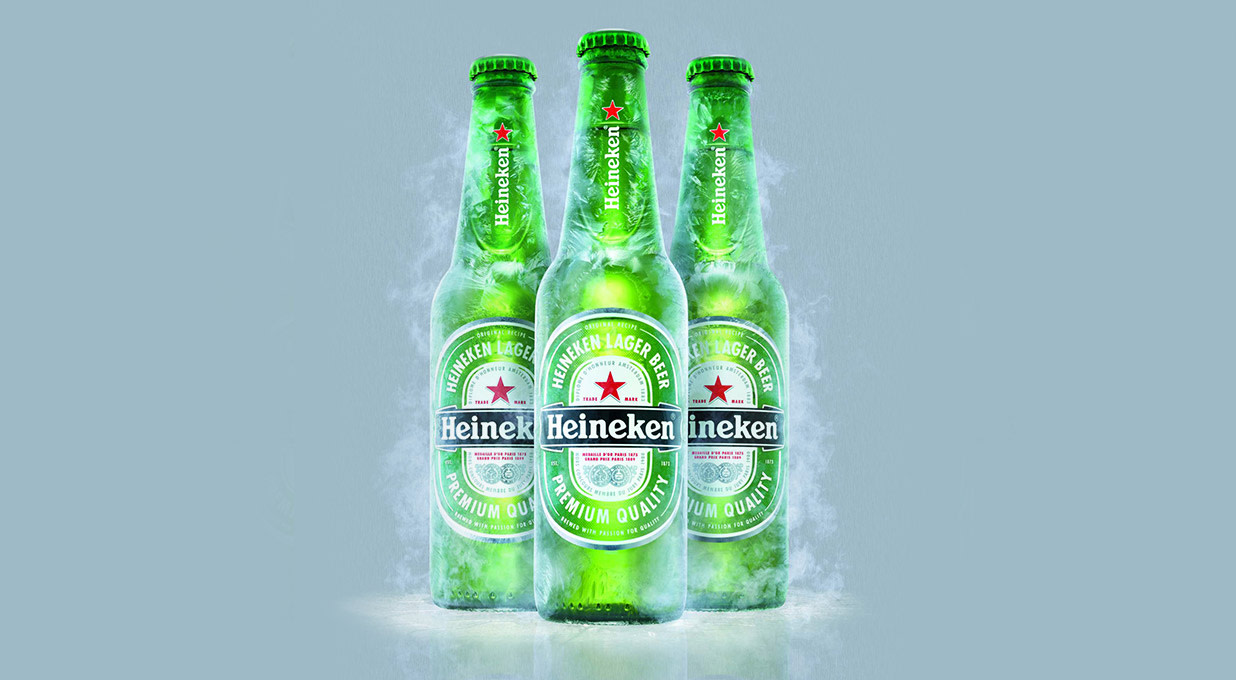Heineken's full-year net revenue grew 5.5% to €30.3bn on an organic basis, as a 4.7% decline in volumes was more than offset by double-digit price hikes. Volumes were lower across all regions, with Vietnam and Nigeria accounting for over 60% of the total decline.
Underlying operating profit grew 1.7% to €4.4bn after a stronger second half, helped by higher prices and a shift towards more premium products.
Free cash flow fell from €2.4bn to €1.8bn largely due to higher investments in equipment. Net debt rose by €2.3bn to €15.8bn at year-end.
Looking to 2024, Heineken expects full-year underlying operating profit to grow in the low-to-high single-digit range.
A final dividend of €1.04 per share has been announced taking 2023's total to €1.73, in line with the prior year.
The shares fell 5.2% following the announcement.
Our view
Heineken's full-year results showed that steep price hikes have left a bad taste in consumers' mouths. Volumes continued to slip in the final quarter, although the rate of decline has eased from the pace seen earlier in the year.
The Group owns high-end favourites such as Heineken, Birra Moretti, Beavertown and many more. For now, near double-digit price hikes are enough to keep nudging revenue in the right direction.
But not much of the higher revenue made its way down to the bottom line, as net profit fell year-on-year. This was largely driven by inflationary cost pressures squeezing margins, as well as the higher interest rate environment leading to a significant rise in financing and interest expenses.
A sharp decline in the Asia Pacific region, which is the group's most profitable area, has also added to the strain. The region's feeling the effects of an economic slowdown, which has hurt progress. Regardless, the group still sees it as a key area for growth. We're inclined to agree, and when the economy picks back up here, it should put plenty of wind in Heineken's sails.
Encouragingly, non-alcoholic offerings have continued to show positive momentum. Headlined by the leading Heineken 0.0 brand, the group has a growing portfolio of non-alcoholic beers and ciders, and holds the number-one spot in many of its markets.
The eB2B platform is another shining light. This makes it easier for business customers, like bars and pubs, to order in their selected drinks - while simultaneously cutting out sales reps to improve margins. The platform captured €11.0bn in trading value in 2023, a 28% uplift on the prior year.
The ratio of net debt to cash profits sits at 2.4 times, just inside management's long-run target of under 2.5 times. We're not concerned at this point, but with higher interest rates pushing up the cost of funding this debt, we'd like to see this ratio move lower in the near future.
All in, Heineken's falling volumes suggest some consumers have reached their saturation point. A return to growth in the group's key Asia Pacific market will be key to steering profits back in the right direction. Until signs of that begin to emerge, we don't see many catalysts for a material uplift in the valuation.
Environmental, social and governance (ESG) risk
The food and beverage industry tends to be medium-risk in terms of ESG though some segments like agriculture, tobacco and spirits fall into the high-risk category. Product governance is a key risk industry wide especially in areas with strict quality and safety requirements. Labour relations and supply chain management are also industry wide risks, with other issues varying by sub-sector.
According to Sustainalytics, Heineken's management of ESG risks is strong. Heineken aims to reach net zero in scope 1 and 2 emissions, as well as reduce scope 3 emissions by 21% by 2030. Net zero across the entire value chain is expected by 2040. Investors should keep in mind that product consistency and quality is a major selling point for Heineken. Any slip-up on this front could lead to brand damage and the potential to lose market share and revenue.
Heineken key facts
All ratios are sourced from Refinitiv. Please remember yields are variable and not a reliable indicator of future income. Keep in mind key figures shouldn't be looked at on their own - it's important to understand the big picture.
Overseas dividends can be subject to withholding tax which may not be reclaimable.
This article is original Hargreaves Lansdown content, published by Hargreaves Lansdown. It was correct as at the date of publication, and our views may have changed since then. Unless otherwise stated estimates, including prospective yields, are a consensus of analyst forecasts provided by Refinitiv. These estimates are not a reliable indicator of future performance. Yields are variable and not guaranteed. Investments rise and fall in value so investors could make a loss.
This article is not advice or a recommendation to buy, sell or hold any investment. No view is given on the present or future value or price of any investment, and investors should form their own view on any proposed investment. This article has not been prepared in accordance with legal requirements designed to promote the independence of investment research and is considered a marketing communication. Non-independent research is not subject to FCA rules prohibiting dealing ahead of research, however HL has put controls in place (including dealing restrictions, physical and information barriers) to manage potential conflicts of interest presented by such dealing. Please see our full non-independent research disclosure for more information.


